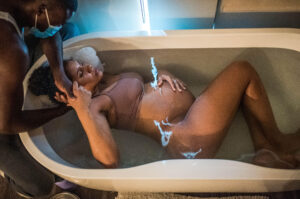
Giving birth as a Black woman in America is no easy job. According to the Centers for Disease Control and Prevention, it was estimated that in 2019 Black women were two to three times more likely than white women to die from giving birth in a traditional hospital.
There are a few alternatives from traditional hospital births that two FAMU alumnae highlight and share.
Catherine Bryant, a recent FAMU School of Journalism and Graphic Communication alumna, last month gave birth at a midwife center.
“I already knew I wanted to do a home birth because my mother did many at-home births and only one traditional hospital birth. I basically just had to call the midwife center ahead of time because they only take a certain amount of births a month, and they checked to see if I had any underlying conditions or anything that would consider me high risk, check my insurance, and from there I showed up to the appointment and had my baby from there,” said Bryant.
Carla Burke, a FAMU alumna and pharmacist, has recently done an at-home water birth in March.
“I originally just reached out to a midwife or doula in the area and met up with her, they checked to see if I had preexisting conditions because they will not recommend an at home birth if you do. Once it came to labor I set up a kiddie pool, filled it with water, and called the midwife. She continuously did check ups before when I was pregnant and after I had my child. And I had my baby three hours later,” said Burke.
The pandemic truly affected many women’s experiences with their pregnancy and giving birth. Some women were not allowed to have a support system while giving birth in traditional hospitals.
“I know of many women especially in New York who could not have anyone in the room with them while giving birth, just nurses and doctors. I could not imagine what that must have felt like especially not having that support system in the room with you,” Bryant said. “While giving birth at the midwife center they allowed at least two people as support in the room.”
Maternal mortality among Black women has been markedly higher than for those of other races and ethnic heritage since 2003, according to the Florida Department of Health. Many Black women are either unsure of alternative births, just not aware of the alternatives to the hospital, or cannot do alternative births due to preexisting conditions.
“I did not realize that this [alternative birth] is super uncommon, most people do not realize that this is an option and could be a reason why the statistics are so high,” Bryant said.
Burke had a traditional hospital birth before having the at-home water birth and compared the two experiences. The traditional hospital birth was seen as more stressful to her.
“I believe that the hospital birth was way more stressful than the at home birth because I feel that they do a lot of unnecessary things like shining the light in the baby’s face, people being in and out of the room every few hours, and the way that they clean the baby after birth,” Burke said.
“Black women’s needs and conditions are not taken seriously which might have to do with preexisting conditions and not having great healthcare in general,” she added.
Hospital births can be considered very expensive compared to the alternative at home or midwife center birth.
According to an article by Business Insider, a birth at a United States hospital can cost up to $10,808 while it cost only cost $4,800 for Burke to have a midwife assist her with the birth.
“The fee for the midwife was only $4,800 in which I paid in portions weekly until the 36 weeks were completed,” said Burke. “The midwife also asked if I wanted certain tests such as the hearing screening, Vitamin K injection, and antibacterial appointment that a hospital will just do and charge you money for which can run your bill even higher.”
Alternative births can be seen as cost effective, life saving, and less stressful to Black women who do not have preexisting conditions and who do not need constant medical attention from doctors.